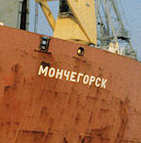 Retired Russian merchant ship Monchegorsk, alleged to be carrying Iranian arms shipments, wound up in Cypriot hands after being forced by the U.S. Navy to moor in Cyprus last week. The ship was searched by Cypriot authorities which on Tuesday turned over to the U.N. a report on what was found on the ship. What exactly is on the ship and where the ship was headed remain subjects of speculation. At issue, however, is whether the Iranian cargo violates U.N. Resolution 1747 and, if so, what to do about it. Paragraph 5 of that resolution declares that Iran “shall not supply, sell or transfer directly or indirectly … any arms or related materiel.”
Retired Russian merchant ship Monchegorsk, alleged to be carrying Iranian arms shipments, wound up in Cypriot hands after being forced by the U.S. Navy to moor in Cyprus last week. The ship was searched by Cypriot authorities which on Tuesday turned over to the U.N. a report on what was found on the ship. What exactly is on the ship and where the ship was headed remain subjects of speculation. At issue, however, is whether the Iranian cargo violates U.N. Resolution 1747 and, if so, what to do about it. Paragraph 5 of that resolution declares that Iran “shall not supply, sell or transfer directly or indirectly … any arms or related materiel.”
The story starts two weeks ago when the U.S. Navy stopped the ship in the Red Sea on the suspicion that it was carrying an arms shipment to the Gaza Strip. The U.S. Navy boarded and searched the ship with the permission of its captain. According to U.S. military officials, the search uncovered “small munitions.”
Adm. Mike Mullen, the chairman of the U.S. Joint Chiefs of Staff, said his country had done all it could to intercept the ship’s suspected arms shipment to Hamas militants in the Gaza Strip, but its hands were tied. …
“The United States did as much as we could do legally,” Mullen said Tuesday. “We were not authorized to seize the weapons or do anything like that.”
Mullen’s statement is consistent with U.N. Resolution 1747 which requires the U.S. to prohibit U.S. citizens from procuring arms from Iran and from using U.S.-flag vessels to carry U.S. arms, both of which are already prohibited under U.S. law by the Iranian Transactions Regulations and the International Traffic in Arms Regulations (“ITAR”). Nothing in 1747 authorizes the U.S. to seize the weapons or the ship; instead the ship was escorted by the U.S. Navy to Cyprus
Cyprus, on the other hand, can do a bit more. Resolution 1747 forbids Cyprus from using a Cypriot-flagged vessel from carrying Iranian arms or related materiel. That would, in theory, permit Cyprus to require the ship to offload any prohibited Iranian cargo in Cyprus. Cyprus, however, is asking the U.N for guidance on what to do. The Cyprus Mail quoted the Cypriot Foreign Minister Markos Kyprianou on the affair:
Cyprus filed a report to a United Nations sanctions committee on Tuesday and would await a verdict before taking further action, Foreign Minister Markos Kyprianou said.
He declined to specify what the Cypriot report said, saying it was confidential.
“There is an issue because of the origin of the cargo, and there should be an assessment on whether the specific cargo falls within the prohibitions of the (Security Council) resolutions. That is where we are expecting guidance from the United Nations,” Kyprianou told reporters.
He said the vessel, anchored off the southern port of Limassol from January 29, would remain there until a definitive decision is taken.
It’s not clear why Kyprianou needs guidance whether the cargo consists of “arms or related materiel.” Even if the ship only contains small munitions, as stated by U.S.-military officials, those clearly fall within the definition. The Jerusalem Post claims that the cargo includes “propellant and casings for artillery and tank rounds.” Debka File, not always an entirely credible source, claims that ship is carrying “10 containers of Iranian rockets.” If any or all of this is true, Kyprianou can’t let a Cypriot-flagged ship carry this cargo.
 Permalink
Permalink
Copyright © 2009 Clif Burns. All Rights Reserved.
(No republication, syndication or use permitted without my consent.)

 Posted by
Posted by  Category:
Category: 

